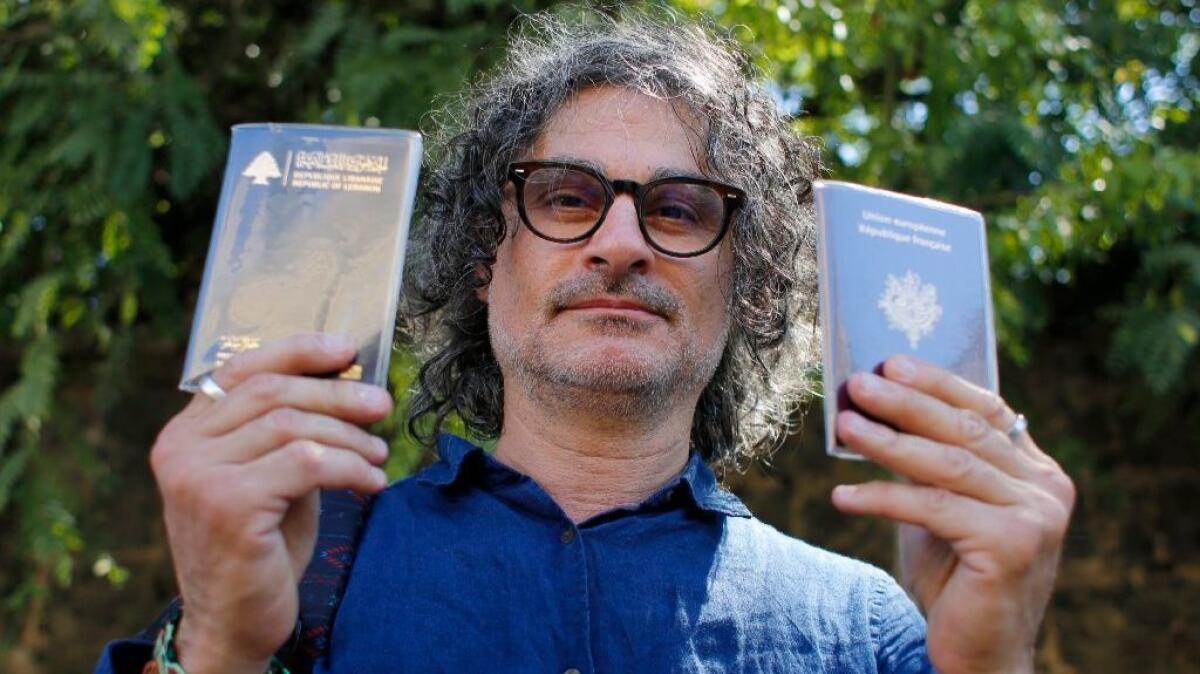Ziad Doueiri’s latest controversial film, ‘The Insult,’ is on Oscar’s shortlist

Ziad Doueiri has no problem with controversy.
The Lebanese-born American citizen — a former camera assistant for Quentin Tarantino — has directed a number of films telling fraught stories set in the Middle East. His award-winning, semi-autobiographical “West Beirut” depicted the partitioning of the Lebanese capital through the eyes of kids.
His 2012 suicide-bombing drama “The Attack,” shot partially in Tel Aviv, landed him in hot water for violating the Arab League boycott of Israel. It was banned in member nations, including his own.
He says his new foreign-language film, the Oscar-shortlisted “The Insult,” has been banned in countries such as Jordan and Palestine. He’s used to it. In fact, its story springs from extreme responses to provocations.
“Words, in the Middle East, are loaded,” says the energetic, intense filmmaker. “Here, I can get involved in a fight with somebody, I can curse his race or … it can turn into a fistfight, but more likely it won’t be more than that.”
But there, he says, “When you draw a picture of the Prophet Muhammad, it becomes a riot. Like we say in Lebanon, it’s always sitting on the hand of a devil.”
“The Insult” begins with a mishap in Beirut. Tony, a Lebanese Christian, accidentally spills water from his balcony on Palestinian-refugee construction worker Yasser below. Vicious words are spoken, which eventually escalate to a spoken wish for the elimination of an entire people. There’s a physical assault. The fight becomes a courtroom drama and inflames tensions across the city.
Doueiri owns up to the hotheaded roots of the story: “Three years ago, while I was watering my plants, I got in a fight with a Palestinian guy because the water was falling on him. And I told him, ‘You know, [former Israeli Prime Minister Ariel] Sharon should have wiped you all out.’
“Joëlle Touma, the co-screenwriter [and Doueiri’s ex-wife], she says, ‘How could you tell this to a Palestinian?’” says Doueiri, adding that he apologized to his neighbor: “I’m sorry, I didn’t mean that.”
Soon after, Doueiri came back to Touma with the nut of the “Insult” screenplay.
“Slowly, I have come to terms that this is the result of my own past,” he says. The Lebanese Civil War “started in 1975, when I was age 12. It’s not something I saw on TV; I lived it, day in, day out, all the way until I left. There was a sense of injustice happening. As simple as getting stopped at a checkpoint. We got stopped at a checkpoint all the time. I got beaten up at a checkpoint.
“There were a lot of things when I was a child when I would ask myself, and I’m only remembering it now, ‘This is not fair. This is not fair,’” he adds. “This registers on your hard disk. Then you go on, you become an adult, you move to the States, you get married, you have kids. You’ve become so sensitive to it, but it’s become hidden – until small incidents … ”
Despite what he calls a “black spot” on his name for shooting “The Attack” in Israel, he says the Lebanese actors he chose for “The Insult” were “courageous enough — they didn’t discuss it with me; they wanted to work with me. I learned later they were criticized: ‘How could you work with him?’ But it’s not unique. When you work in the Middle East, you’re going to get attacked somehow, from either the left or the right or the center.”
Proof came when “The Insult” premiered in Lebanon.
“We were boycotted by half the population, to tell you the truth,” says Doueiri. “The movie theaters in the Christian sections of town were packed, and in the Muslim parts, they were empty. That’s the sad reality. And I’m from a Muslim [Sunni] background. And I grew up in a very left-wing, pro-Palestinian family.”
If it seems odd that the Muslim community would turn its back on a film depicting the Muslim character as the bigger man in a dispute, Doueiri says he expected it.
“Because of ‘The Attack’ … I was labeled as someone who is for normalizing with Israel; I was labeled as pro-Zionist.” He told The Times in 2013 that the film drew criticism for not being “extremely demonizing of Israel.”
Doueiri remains undeterred to return to the roiling region for his subjects. He’s researching a project on the 1978 Camp David Accords, in which the U.S. tried to broker peace between Israel and Egypt.
“There are a lot of stories to be told. It’s not a comfortable place. I thrive on stuff like this,” he says, stressing that “The Insult” is not as dark and negative as its subject matter might imply.
“I wanted to give hope. I believe there’s hope,” Doueiri says. “And I think dramatically it’s more interesting. It’s a flower on a dung heap.”
More to Read
Only good movies
Get the Indie Focus newsletter, Mark Olsen's weekly guide to the world of cinema.
You may occasionally receive promotional content from the Los Angeles Times.






